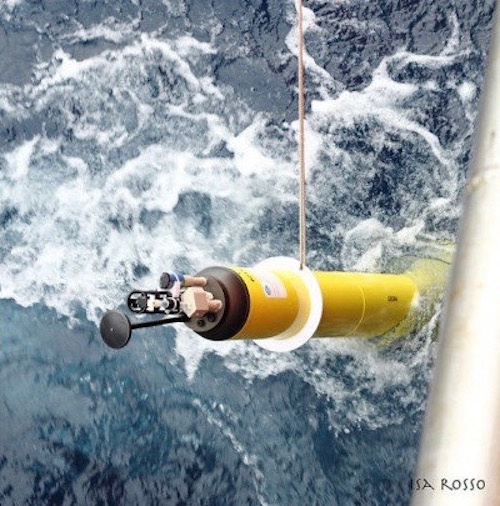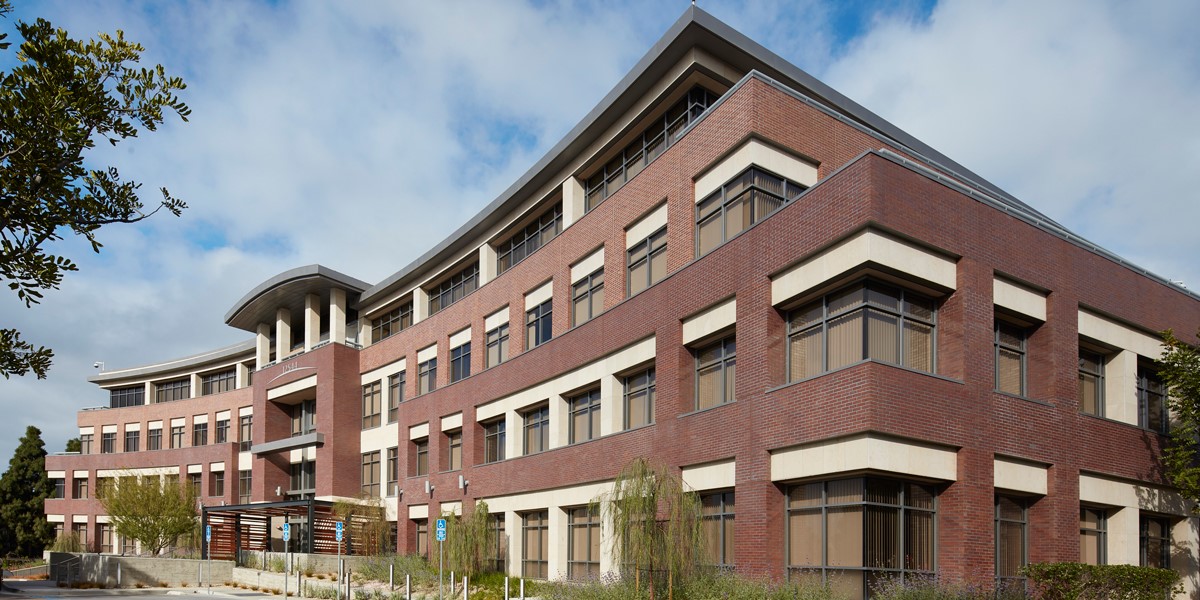Daily Business Report-Nov. 2, 2020
A biogeochemical float deployed by the Southern Ocean Carbon and Climate Observations and Modeling program in 2017. (Photo: Isa Rosso)
NSF grants $53 million to create
global fleet of robotic ocean floats
The National Science Foundation (NSF) has approved a $53 million grant to a consortium of the country’s top ocean-research institutions to build a global network of chemical and biological sensors that will monitor ocean health. Scientists at the Scripps Institution of Oceanography, Monterey Bay Aquarium Research Institute (MBARI), University of Washington, Woods Hole Oceanographic Institution, and Princeton University will use this grant to build and deploy 500 robotic ocean-monitoring floats around the globe.
This new network of floats, called the Global Ocean Biogeochemistry Array (GO-BGC Array), will collect observations of ocean chemistry and biology between the surface and a depth of 2,000 meters. Data streaming from the float array will be made freely available within a day of being collected, and will be used by scores of researchers, educators, and policy makers around the world.
_____________________________________________
Callaway Golf acquires Topgolf for $2 billion
Carlsbad-based Callaway Golf agreed to purchase Topgolf Entertainment Group, a driving-range operator, for $2 billion. In addition to bringing Callaway, known for its clubs and golf balls, into the fast-growing sports-entertainment business, the deal will provide Topgolf with additional financial support to pursue expansion plans beyond its current 58 North American venues.
_____________________________________________
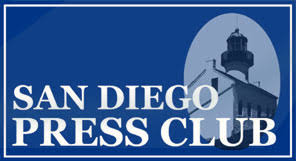
Congratulations to the winners of the 47th annual
Excellence in Journalism Awards
Click here for a list of all the winners
_____________________________________________
Viasat wins contract under U.S. Army
initiative for unmanned aircraft support
Viasat will collaborate with AeroVironment Inc. on a contract awarded under a U.S. Army initiative to support small unmanned aircraft. The partnership will support military customers’ ability to deploy a robust, on-demand, highly secure communications network that will address the growing electronic warfare capabilities of peer and near-peer adversaries.
_____________________________________________
City of San Diego goes digital for special event permits
New online system makes event permitting process
more convenient, user-friendly and reduces waste
The City of San Diego has unveiled a new online system for the public to submit and receive permit applications for special events held within city limits. The implementation of Eproval by the city’s Special Events and Filming Department is designed to improve the customer experience by making the permit process more efficient and transparent. This new process will streamline all permit requests.
The Eproval system will provide several benefits related to the special event approval process including:
- Online application and approval process. Event organizers can now access their applications at any time of day, with no need to wait until offices are open to move the approval process along.
- Centralized digital storage. All users can view safe, accurate and timely application information online. The public can also duplicate a previous application for recurring events, saving time and reducing the number of meetings (both in person and virtual), phone calls and emails. City staff can also review past event applications for historical context to assist in the approval process.
- Real-time transparency. Applicants can log in and see where their application is in the approval process.
_____________________________________________
UC San Diego’s largest class is learning via
a hybrid of remote and in-person instruction this fall
UC San Diego announced that its record-setting population of more than 40,000 students are working toward their degree this fall with a hybrid of in-person and remote instruction. Fall instructional plans are centered on an incremental repopulation of campus to allow for effective physical distancing amid the COVID-19 pandemic.
The plans also include face covering requirements, regular asymptomatic and symptomatic testing, wastewater monitoring, case isolation, exposure notification and contact tracing.
The campus’s nationally recognized, evidence-based comprehensive Return to Learn program has three adaptive pillars (risk mitigation, viral detection and intervention) that have allowed the university to resume campus activity in the safest way possible, officials said. Details on testing and cases for SARS-CoV-2 among students, faculty and staff can be found at the UC San Diego COVID-19 Daily Dashboard
_____________________________________________
Voit Real Estate Services collaborates with
Tangerine Energy for battery storage locations
Voit Real Estate Services, a privately held, broker-owned Southern California-based commercial real estate firm has announced an exclusive collaboration with Tangerine Energy, an energy development company. The new venture aims to lease and/or acquire as many as 50 industrial warehouse and/or land sites per year over the next five years to house battery storage centers in population-dense geographies that experience significant price volatility.
“This strategy is a win-win for commercial property owners seeking stability in the current market,” said Todd Holley, senior vice president in Voit’s San Diego office. “Each industrial warehouse or land site will be either acquired or fully leased by a credit tenant for up to a 15-year term. This delivers stabilized, cash flow assets — a welcome addition to most investors’ portfolios in uncertain times. Battery storage sites require significantly less space than solar farms and can be integrated throughout high density areas, to serve the needs of local markets.”
_____________________________________________
Public trust in science on the rise
during COVID-19 pandemic
SDSU NewsCenter
When sweeping lockdowns changed nearly every aspect of daily life in March, the world sat up and took notice of the novel coronavirus. Since then, terms such as social distancing, aerosols, asymptomatic, and superspreaders have become common parlance.
And the general public has begun paying attention to news about testing and vaccine development and trusting science and scientists much more than the pre-COVID-19 era, a 3M report on the state of science found.
Surveying more than 1,000 people in 14 countries before the pandemic, then again in 11 countries during the pandemic, 3M researchers found that trust in science has increased to a three-year high. Skepticism has decreased well below pre-pandemic levels to 28% — politics notwithstanding.
Veteran scientists from different San Diego State University colleges found this to be largely true among their own circles of family and friends, and amidst the public. Each weighed in on how to build on this trust going forward.
_____________________________________________
Rady School of Management highly
ranked by Poets & Quants magazine
The Rady School of Management at UC San Diego has been recognized as one of the Best MBA Programs for Entrepreneurship 2021 by Poets & Quants magazine. This ranking evaluated criteria such as the number of startups launched by alumni immediately after graduation, the number of courses focused on entrepreneurship and innovation and opportunities outside of the classroom for students to engage in entrepreneurship.
“At the Rady School, we integrate entrepreneurship education throughout the MBA curriculum and through comprehensive programming that supports students at every stage of moving business ideas to market,” said Rady School Dean Lisa Ordóñez.
“More than 180 companies have been founded by our alumni, creating an economic impact of over $2 billion since our founding in 2003.”
_____________________________________________
UBS adviser Kalyn Maher Walker named to
Working Mother’s Top Wealth Adviser Moms list
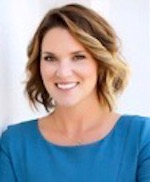
Kalyn Maher Walker, vice president–wealth management and financial adviser at UBS in San Diego, has been named to the Working Mother/SHOOK Research Top Wealth Advisor Moms List for 2020. This fourth-annual listing features the top 500 mothers working in wealth management today.
Walker, who joined the firm in 2014, has more than a decade of experience in the financial services industry. She started her career working with her father, also a financial adviser, when she was just out of college. Walker also ranked within the top 100 of 2019’s Working Mother’s Top Wealth Advisor Moms list and in the 2020 Forbes list of Top Next-Gen Wealth Advisors.
Internally, UBS has recognized Walker several times in its Top 35 Under 35 Program. She is part of the Maher-Walker and Zeigler team located in Carmel Valley, which serves select clients and families in San Diego and the surrounding areas.
SHOOK Research considered women advisers with at least one child living at home under the age of 21.
_____________________________________________
Nonprofit Institute releases 2020
San Diego Regional Quality of Life Dashboard
The Nonprofit Institute at the University of San Diego (USD) is sharing the latest data from The Equinox Project’s 2020 San Diego Regional Quality of Life Dashboard which tracks key environmental and economic indicators in San Diego, following the central theme: Is our quality of life improving?
Key takeaways from this year include:
- Communities with the poorest air and water quality are also experiencing the highest rates of COVID-19 and unemployment.
- The number and duration of beach closures caused by the Tijuana River increased 180 percent from 2018 to 2019 and is at its highest since 2008.
- The combined number of unhealthy air days, including unhealthy air days for sensitive groups, decreased from 35 in 2018 to 25 in 2019 and air quality figures are the lowest they’ve been since 2010.
- Residents in the City of San Diego can enjoy more parkland than any other major city in California and over 80 percent of residents can walk to a park.
- There is a difference of 46 percent between the most and least walkability in the county. Escondido has the least walkability and also a fairly high poverty rate, due to environmental racism, redlining and maldistribution of funds.
A full look at the 2020 Quality of Life Dashboard can be found here
_____________________________________________

NSF awards $39 million to UC San Diego
to better integrate renewables into power grid
The National Science Foundation has awarded $39 million to a team of engineers and computer scientists at the University of California San Diego to build a first-of-its-kind testbed to better understand how to integrate distributed energy sources such as solar panels, wind turbines, smart buildings and electric vehicle batteries into the power grid. The goal is to make the testbed available to outside research teams and industry by 2025.
The major driver for the project is the need to decarbonize the electrical grid, protect it from cybersecurity attacks and make it more resilient. To provide 50 percent—or more—of power from clean energy sources, power grids will have to be able to leverage distributed energy sources, and reliably manage dynamic changes, while minimizing impact on customer quality of service.
“We will be replicating the entire California power grid on one campus,” said Jan Kleissl, a professor in the Department of Mechanical and Aerospace Engineering at UC San Diego and the project’s principal investigator.
_____________________________________________
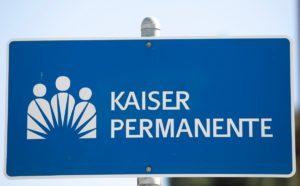
Kaiser Permanente cited for failing to treat COVID-19 as airborne
CalMatters
California workplace safety officials issued a serious citation against a Kaiser Permanente psychiatric facility in Santa Clara, accusing the center of failing to provide workers with N95 masks and other protection against COVID-19. But the problems facing the health care giant may run much deeper.
The citation, issued Wednesday by the state’s Division of Occupational Safety and Health with a proposed fine of $11,200, is the first in an expected wave of citations against Kaiser Permanente facilities statewide for failing to acknowledge that COVID-19 can be transmitted via aerosol particles, according to a source inside Cal/OSHA, who asked not to be identified. Kaiser told CalMatters on Thursday that it plans to appeal.
The agency found that Kaiser systematically failed to comply with California health and safety standards for aerosol transmissible diseases (ATD), the source said, even after early studies showed that the virus could survive in the air. California instructed employers in May to assume that was the case, and most California hospitals complied. After a series of evolving statements, the Centers for Disease Control and Prevention updated its guidelines last week to say that COVID-19 transmission can be, in fact, airborne.
Cal/OSHA’s citation thrusts the health care giant into the heart of a national battleover how hospitals and other health care employers should keep workers safe not only from virus particles that can hurl through the air in droplets from a sneeze or cough but also hover in the air after being exhaled by those infected. The nurses union welcomed California’s enforcement action to protect frontline health workers.

